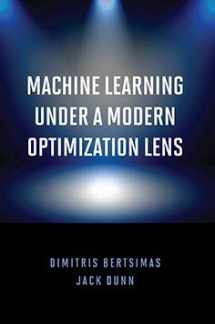
Machine Learning Under a Modern Optimization Lens
Book details
Summary
Description
The book provides an original treatment of machine learning (ML) using convex, robust and mixed integer optimization that leads to solutions to central ML problems at large scale that can be found in seconds/minutes, can be certified to be optimal in minutes/hours, and outperform classical heuristic approaches in out-of-sample experiments.
Structure of the book:
Part I covers robust, sparse, nonlinear, holistic regression and extensions.
Part II contains optimal classification and regression trees.
Part III outlines prescriptive ML methods.
Part IV shows the power of optimization over randomization in design of experiments, exceptional responders, stable regression and the bootstrap.
Part V describes unsupervised methods in ML: optimal missing data imputation and interpretable clustering.
Part VI develops matrix ML methods: sparse PCA, sparse inverse covariance estimation, factor analysis, matrix and tensor completion
.
Part VII demonstrates how ML leads to interpretable optimization.
Philosophical principles of the book:
Interpretability is materially important in the real world.
Practical tractability not polynomial solvability leads to real world impact.
NP-hardness is an opportunity not an obstacle.
ML is inherently linked to optimization not probability theory.
Data represent an objective reality; models only exist in our imagination.
Optimization has a significant edge over randomization
.
The ultimate objective in the real world is prescription, not prediction.


We would LOVE it if you could help us and other readers by reviewing the book
Book review



